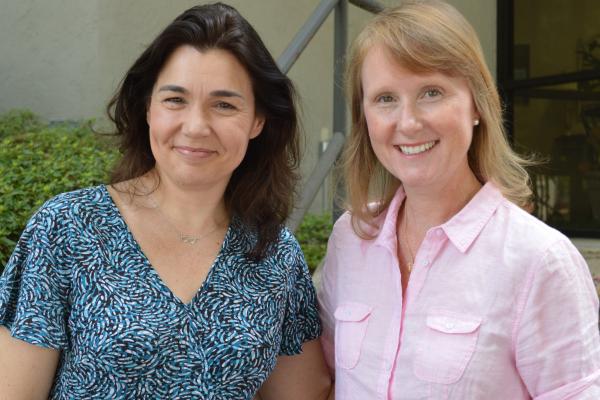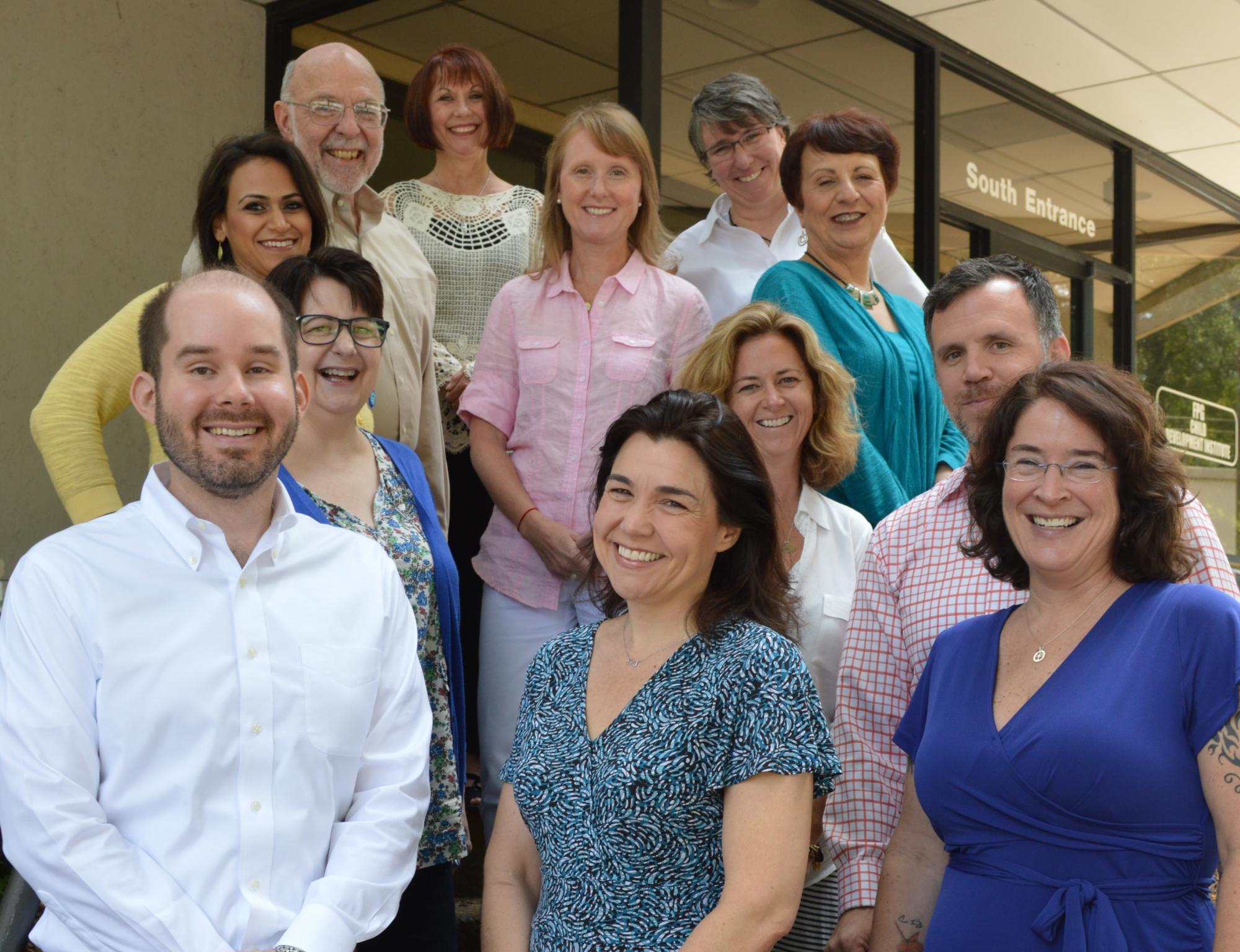
New Era of Leadership Opens at FPG's National Implementation Research Network
 When Dean Fixsen and Karen Blase created the National Implementation Research Network (NIRN) in 2002 to accelerate growth in the field of implementation science, only a handful of implementation experts existed. With FPG’s support, NIRN has since flourished, organizing practitioners, program developers, researchers, and policymakers—and people in numerous roles and disciplines have come to better understand the benefits of implementation science. Now, NIRN encounters new opportunities as its co-founders pass the responsibilities for leading the seminal FPG project to scientists Melissa Van Dyke and Allison J. Metz, two highly respected implementation experts who have served as co-directors of NIRN for the past year with Fixsen and Blase. (Van Dyke, left, and Metz, right, flank Fixsen and Blase.)
When Dean Fixsen and Karen Blase created the National Implementation Research Network (NIRN) in 2002 to accelerate growth in the field of implementation science, only a handful of implementation experts existed. With FPG’s support, NIRN has since flourished, organizing practitioners, program developers, researchers, and policymakers—and people in numerous roles and disciplines have come to better understand the benefits of implementation science. Now, NIRN encounters new opportunities as its co-founders pass the responsibilities for leading the seminal FPG project to scientists Melissa Van Dyke and Allison J. Metz, two highly respected implementation experts who have served as co-directors of NIRN for the past year with Fixsen and Blase. (Van Dyke, left, and Metz, right, flank Fixsen and Blase.)
The inaugural issue of Implementation Science defined their discipline as “the scientific study of methods to promote the systematic uptake of research findings and other evidence-based practices into routine practice,” often in typical service and community settings. As a field, the science and practice of implementation has been developing since the Great Society programs began in the 1960s. By the time Fixsen and Blase created NIRN, they already had spent decades learning about evidence-based programs and how to use them with optimal results in many different settings.
“It had become clear that implementation was the key to realizing the benefits of evidence-based programs on a socially significant scale,” said Fixsen.
 Today, implementation science is hot. In a recent edition of Exceptional Children, Fixsen, Blase, Metz, and Van Dyke identified the main reason for its demand: the powerful inertia to which systems naturally succumb and which can “overwhelm virtually any attempt to use new evidence-based programs.” Not surprisingly, a passive “train and hope” approach to implementation rarely succeeds in the meaningful realization of evidence-based practices. Also ineffective: implementation by laws, mandates, or regulations alone; implementation by only providing funding or incentives; implementation without changing supporting roles; and implementation solely based on the diffusion or dissemination of information.
Today, implementation science is hot. In a recent edition of Exceptional Children, Fixsen, Blase, Metz, and Van Dyke identified the main reason for its demand: the powerful inertia to which systems naturally succumb and which can “overwhelm virtually any attempt to use new evidence-based programs.” Not surprisingly, a passive “train and hope” approach to implementation rarely succeeds in the meaningful realization of evidence-based practices. Also ineffective: implementation by laws, mandates, or regulations alone; implementation by only providing funding or incentives; implementation without changing supporting roles; and implementation solely based on the diffusion or dissemination of information.
“Those strategies alone routinely produce only 5–15 percent success rates,” said Blase. “However, a purposeful investment in implementation can produce significantly greater gains for program recipients.”
Only about 20 percent of people and organizations may be ready to be mobilized to bring an evidence-based program into practice, but planned and strategic implementation can help to create readiness, identify and nurture leaders, develop “buy in”, and locate or provide supports. In addition, implementation science includes effective processes and mechanisms to anticipate issues and barriers as use of an evidence-based program sends ripples through organizations and systems.
According to Fixsen, the small number of experts in implementation science before NIRN’s founding has since increased exponentially, and the field is ready for the next leap forward. (Metz, between Fixsen and Blase, and Van Dyke, front row, center, shown here with members of the NIRN team.)
“Melissa Van Dyke and Allison Metz are in a great position to lead NIRN and to lead the next generation of implementation scientists and practitioners,” added Blase. “They have been outstanding contributors to implementation science and have gained the trust and admiration of scientists, practitioners, and leaders in human services in the U.S.—and around the globe.”
“As I’ve aged, I’ve come to realize we’re all born into families and groups of associates that have been developing for millennia and will continue to develop after our time has passed,” said Fixsen. “I’m proud of what has been accomplished and sad to participate less in the next steps, but I recognize that is the natural course of events. NIRN and the field of implementation are in excellent hands.”
Both Metz and Van Dyke expressed their deep appreciation for the mentorship Fixsen and Blase provided to them and for the invaluable foundation on which NIRN can continue to build.
“We feel fortunate to have had the opportunity to work for and learn with Dean and Karen over these last years,” said Van Dyke. “It truly is exciting to be a part of this rapidly developing field of study.”
“We’re delighted to be part of a team of committed ‘scientist practitioners’—or ‘practitioner scientists,’” Metz added. “We’ll continue to learn together and contribute to the growing knowledge and practice base of implementation.”
Fixsen plans to spend less time on the road for NIRN projects, more time writing a book on implementation science, and more time visiting family and friends around the country. Blase will continue her work in education but with more time for implementation projects, creative endeavors, and travel, as well as for friends and family.
“It will be exciting to see how the field of implementation science develops and the contributions that NIRN will make with great leadership from Allison and Melissa,” said Blase. “There’s still so much to do and learn.”
Read more about FPG’s National Implementation Research Network
Visit NIRN’s Active Implementation Hub
Read more about NIRN and implementation science: “When Just Do It! Doesn’t Do It”
Read about one of Karen Blase’s studies: “Researchers Bring Product Testing to Foster Care”
Read about one of Allison J. Metz’s projects: “Success Coaches Keep Families Together”
DS
